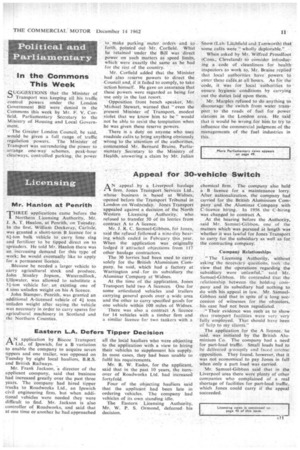In the Commons This Week
Page 13

If you've noticed an error in this article please click here to report it so we can fix it.
QUGGESTIONS that the Minister of
■ --) Transport was keeping all his traffic control powers under the London Government Bill were denied in the , Commons this week by Mr. F. V. Cm''field, Parliamentary Secretary to the Ministry of Housing and Local Government.
• The Greater London Council, he said, would be given a full range of traffic regulation powers. The Minister of Transport was surrendering the power to arrange one-way schemes, peak-hour clearways. controlled parking, the power to make parking meter orders and so forth, pointed out MT. Corfield. What he retained under the Bill was direct power on such matters as speed limits, which were exactly the same as he had for the rest of the country.
Mr. Corfield added that the Minister had also reserve powers to direct the Council and, if it failed to comply, to take action himself. He gave an assurance that these powers were regarded as being for use only in the last resort.
Opposition front bench speaker, Mr. Michael Stewart, warned that "even the present Minister of Transport, modest .violet that we know him to. be " would not be able to resist the temptation when he was given these reserve powers.
There is a duty on anyone who uses roadside cafes to bring anything obviously wrong to the attention of the authorities, commented Mr. Bernard Braine, Parliamentary Secretary to the Ministry of Health, answering a claim by Mr. Julian Snow (Lab. Litchfield and Jam Worth) that some cafés were " wholly deplorable."
When asked by Mr. Wilfred Proudfoot (Cons., Cleveland) to consider introducing a code of cleanliness for healthinspectors to work to, Mr. Braine replied that local authorities have Powers to enter these cafes_at all hours. As for the • code, it was for local authorities to ensure hygienic conditions by carrying out the duties laid upon them.
Mr. Marples refused to do anything to discourage the switch from water transport to the roads of fuel for power stations in the London area. He said that it would be wrong for him to try to influence the commercial judgment of the managements of the fuel industries in this.




















































































































